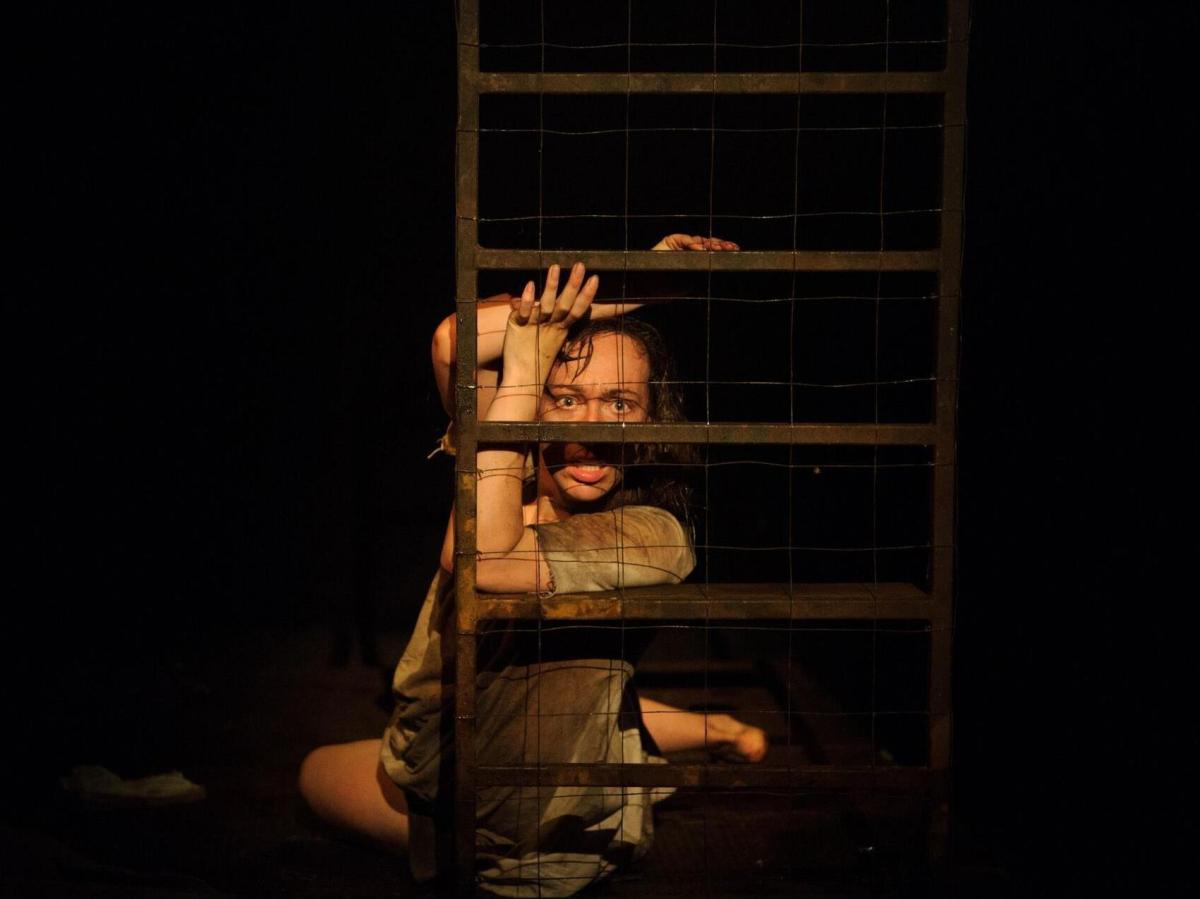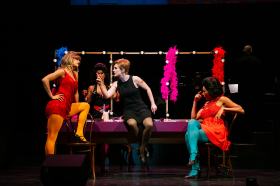Image: Emily Goddard performs in This is Eden. Photograph by Sarah Walker.
Towards the end of Emily Goddard’s This is Eden, the central character, a female convict transported to Australia, recalls some wise words from her father. He told her, ‘When a man forgets, that’s when he gets dangerous’. Once uttered, this sentence immediately becomes a statement about Australia. With this piece, Goddard uses the story of female convicts in sordid factory conditions to examine, and to partially undo, the great Australian tradition of forgetting.
In this respect, Goddard joins a number of other Australian women – including Jess Love (Notorious Strumpet and Dangerous Girl) and She Said Theatre (Fallen) – interested in un-forgetting the uncomfortable history of convict transportation, particularly the transportation of women. Many of these works concern themselves with the female body under duress. Goddard has leapt head-first into this territory under the expert guidance of Susie Dee, who yet again directs a fearless, unapologetic performance which oscillates dangerously between the clown and the grotesque. Goddard spends almost the full 70 minutes wringing and contorting her body, with the uncanny and the abject flourishing in unexpected places. The time we spend with this character is indeterminate; it stretches and warps, and reveals to us through her fever-dreams the myriad forces that have acted upon her, such that she finds herself transported, in this convict factory, and pregnant.
But in amongst all this grotesquery and despair, there is also a brilliant lightness, a playfulness, and at times a heady defiance. Much of this lightness comes from the framing device of the narrative, wherein the main body of the performance is enclosed in a historical tour guided by Mary. Our guide is a hapless millennial, proud of her convict heritage and enthusiastic to share it with all of us. It’s a ridiculous clash of tones, and yet not only does it work, it lends the work a structural robustness which allows it to carry a much greater and more complex political weight.
This work concerns itself with past and present conditions of transportation and detention in Australia. The point has often been made of late that white Australians, being ‘boat people’ themselves, are in no position to call for the government to ‘turn back the boats’. Goddard extends this point in This is Eden by pointing out that Australia has a tradition of trying to ‘turn back the boats’ that is almost as old as the colony itself. The script refers, in particular, to the virulent 19th Century media campaign to end transportation. Shockingly, this campaign was not based on humanitarian ideals that transportation was inhumane; rather, the media led a fear-mongering campaign about the violence, immorality and danger of the convicts to the ‘civilised’ populations of the colony. Here we see the dangers, alluded to earlier, of the man – or the group/colony/culture/nation – that forgets. We have not remembered – let alone learned any lesson from – the horrific, genocidal and inhumane period of early Australian colonisation and transportation. And through this forgetting, we have placed people seeking asylum in a situation that echoes the conditions of early Australian convict transportation. It’s an astutely drawn and urgent observation.
At times, I was concerned by the politics of this comparison, which could be accused of leaning on the idea that a white audience will care more about a white subject – why is it we care about Goddard’s character any more than we care about the people seeking asylum whose condition we know to be at least as bad as what is being performed in front of us? However, from my own perspective, I felt this concern was tempered by the fact that this was not a case of misguided ‘colour-blind’ casting. The circumstances in which Goddard’s white convict character found herself were as true as – even if historically removed from – those of people currently seeking asylum, and this pattern of transportations and detentions throughout Australia’s history was the focal point of the piece.
Perhaps the perspective I’ve given here will be argued; perhaps some folks will not respond as favourably to the idea of a white woman in 2017 making a show about being in detention. But we will be all the richer for that conversation, and the debate will make the ideas and the histories that little bit harder to forget. Whatever its impact upon you, this show promises a truly live spectacle, and a courageous grappling with uncomfortable and unsolved (or unsolvable) chapters of our nation’s history.
Rating: 4 1/2 stars out of 5
THIS IS EDEN
Written and Performed by Emily Goddard
Directed by Susie Dee
Dramaturgy by Mark Wilson
Set & Costume Design by Romanie Harper
Sound design & Composition by Ian Moorhead
Lighting design by Gina Gascoigne
45downstairs
27 April – 7 May






